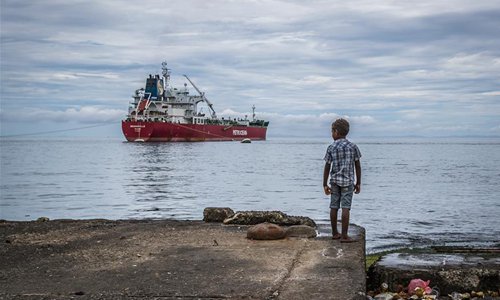Anti-China forces attempt to disrupt flight from China to Solomon Islands to prevent new Chinese ambassador from taking office

A boy watches a distant cargo ship in Honiara, Solomon Islands, Oct. 13, 2019. Photo:Xinhua
Some people in Malaita, the Solomon Islands' most populous province that has been frequently seen playing tricks in attempts to damage the relationship between China and the Solomon Islands, recently clamored to call off a flight returning from China that was reportedly carrying Chinese officials including Li Ming, the new Chinese ambassador to the Solomon Islands.
China's Pacific island regional experts condemned the clamor as a malicious obstruction of resumed Sino-Solomon Island ties, saying it was an effort by US-influenced forces to achieve an anti-China political conspiracy.
"They were deliberately disrupting the reestablishment of diplomatic relations between the two countries if they knew Ambassador Li was on the flight," commented Yu Lei, chief research fellow at the research center for Pacific island countries of Liaocheng University in East China's Shandong Province.
ABC reported on September 3 that new Chinese Ambassador Li was on the flight. The flight had landed at capital Honiara on September 2 local time, a Chinese passenger on the flight told the Global Times on Friday.
The chartered Solomon Airlines flight, taking off from Honiara in the morning of September 1 to Guangzhou, South China's Guangdong Province, via Indonesia and then flying back following the same route, carried 104 passengers among whom 21 were Solomon Islands nationals, Solomon Airlines said on its website.
It was the first flight between China and the Solomon Islands since the COVID-19 outbreak, some passengers said. There won't be more flights in the near future amid the pandemic, they told the Global Times.
The rest of the passengers were Chinese nationals, according to a Radio New Zealand report on September 1.
Most of the Chinese passengers included staffers of the Chinese Embassy in the Solomon Islands, as well as surveying and mapping personnel for the construction of the main stadium for the 2023 Pacific Games in Honiara, said passenger Li Lin. The project is one of the first involving assistance from China in the Solomon Islands since the two countries forged diplomatic ties last year.
Contrary to the so-called health concern of some Malaita people saying the flight could bring the Solomon Islands COVID-19 patients and devastate the local healthcare system, all the passengers were found healthy before taking this flight through repeated COVID-19 tests, said the Solomon Islands National Disaster Council (NDC).
"All [test] results turned out negative, which gave the greenlight to board the special flight," read a NDC statement on September 3.
Li, a Chinese employee at a mining company in Solomon Islands, said he and other passengers on this flight had strictly followed the country's virus-preventing rules during and after the trip.
"We had had three nucleic acid tests before boarding, and we kept wearingN95 masks during the whole flight," Li told the Global Times Friday, adding that the plane was thoroughly disinfected before taking off.
All the passengers went into a 14-day quarantine at designated local hotels after the plane arrived at Honiara, Li said. During the quarantine, they received another three nucleic acid tests and had their body temperature checked every day by Solomon health officials, he added.
Li returned home for vacation in January, when the unexpected COVID-19 outbreak hadn't taken place. "[Through so many tests] we are confident about our health, and we can reassure every one [in the Solomon Islands]," he said.
The passengers including Li were in compliance with both China's and Solomon's COVID-19 prevention regulations, and their boarding met the WHO requirements, said Yu Lei, chief research fellow at the research center for Pacific island countries of Liaocheng University in East China's Shandong Province.
"Obviously, the Malaita protestors stirred up trouble in this flight not for the concerns about the health of local citizens, but for their goal of destroying the Sino-Solomon relationship through smearing [the epidemic situation in China]," Yu told the Global Times Friday.
These protestors had been buzzing about the Guangzhou-Honiara flight for weeks, said a Chinese resident surnamed Wang, who stayed on in the Solomon Islands amid the pandemic. "They disagreed on any flights [from China to enter], saying they're afraid of the virus being brought in," Wang told the Global Times Friday.
Having long been influenced by Western forces including the US and Australia, Malaita is infamous for its pro-Taiwan stance, observers say. Last year, the province reportedly protested against Solomon national government's cutting "diplomatic ties" with the island of Taiwan and acknowledging the one-China principle.
Daniel Suidani, premier of Malaita, announced an independence referendum for Malaita earlier this month, CNN reported on Friday.
Many Chinese residents in the Solomon Islands shrug off the "referendum," with some reached by the Global Times saying that they've got bored with the farces like this that have frequently happened in Malaita.
"Malaita's economy is very bad, but people there seem immersed in creating protests and chaos about little things rather than getting down to [improve their economy]," Wang commented, adding that the overwhelming majority of their protests have come to nothing.
Solomon Islands established formal diplomatic relations with Chinese mainland in September 2019. The history will tell the fundamental and long-term interests of this decision to the people of the Solomon Islands, noted Chinese Sate Councilor and Foreign Minister Wang Yi at the ceremony of the formal establishment of bilateral relations in Beijing.
Several cooperative projects, including the construction of a reinforced concrete bridge near Honiara, have reportedly been launched in the Solomon Islands since the establishment of Sino-Solomon diplomatic relations, bringing jobs and convenience for local people.
As a lesser developed country, the Solomon Islands had been politically and economically dependent on the West for decades, Yu said. It is now eager to achieve a true national independence and prosperity for people through cooperating with emerging Asian economies including China, he said.
The Sino-Solomon relationship is a politically equal and economically win-win one, which is and will keep benefiting the people of both countries, Yu told the Global Times. "Any intrigues trying to ruin this relationship are doomed to failure," he said.



